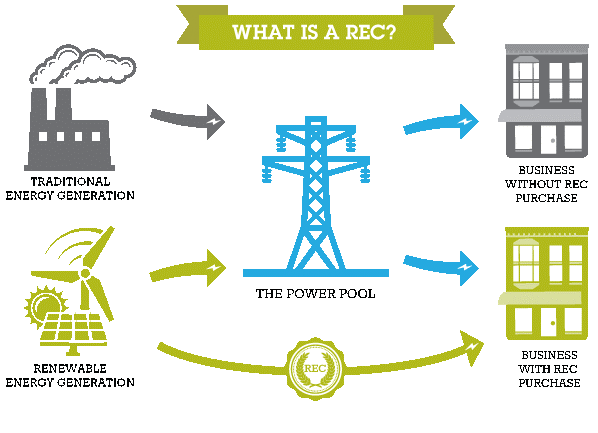
Do you think having more of our electricity come from green renewable sources is important? Did you know there is an easy and cost-effective way to help ensure that happens?
People may quibble over some of the details, but most everyone agrees that renewable is a superior concept. The corollary is that most of us have no idea what to do to help that concept become reality. And even if we personally feel it is important to support the growth of renewable energy, as business owners and entrepreneurs we may not know what the business case is for utilizing green power.
What is Renewable Energy Anyway?
Here in the Pacific Northwest we have huge dams spanning the Columbia and other rivers generating many a megawatt, but is it renewable? Logic would indicate that it is, but the Federal government begs to differ. Only “low-impact hydropower” qualifies. The other types of qualified renewable power plants are:
- Wind
- Solar
- Biomass
- Geothermal
- Fuel cells using renewable fuels
As you can imagine, the proportion of what you get from your utility that is renewable varies with your location. Rarely is it the majority of the power you draw and, unless you purchase direct from a renewable power plant (which is possible) is it never 100%. That Tesla you saw zipping down the highway today? It runs on mostly coal, oil and natural gas.
A Business Case for Renewable Energy
Questions to you may already be considering:
- Is the concept of clean green renewable energy important to your stakeholders?
- Would your prospects and customers be more likely to purchase your products or services if they knew you used 100% emissions-free green power to produce them?
- Would being certifiably “green” differentiate your offerings in the marketplace?
- Is there a “halo effect”?
If you think the answer to these question is “yes” or even “maybe”, then you are on your way towards defining the benefits of greening your power.
What about the costs? Is it worth it?
Every business has its own metrics and how to interpret them. Is renewable power more expensive than just buying whatever your utility offers?
Yes.
Is it much more expensive?
Not really. But again, a good value for one business can be a deal breaker for another.
How to Purchase Green Energy
You have basically three ways to obtain green power:
- Make your own. You can invest the capital to install rooftop solar for instance. This can take many years for you to get to breakeven, in which time the technology has advanced. The useful life of a solar installation is maybe 20-something years.
- Purchase direct. It’s a hassle, but you can arrange to purchase power direct from a wind farm and have it delivered through our local utility. The cost varies but is always more than what you would pay the utility otherwise.
- Purchase Renewable Energy Certificates. This is the simplest and most cost-effective method to create green power for your consumption. It also scales with your business and does not require any investment; you pay as you go!
What is a Renewable Energy Certificate?
Also known as green tags, renewable energy credits, or just RECs, these certificates embody (by statute) all of the renewable energy attributes of the power generated by a certified renewable power plant. Green power is a combination of two things:
- Electricity generated and put into the grid, which is indistinguishable from electricity generated any other way, and
- A Renewable Energy Certificate. A REC is generated every time a renewable power plant produces one megawatt-hour (one thousand kilowatt-hours) of electricity. RECs are traceable by their serial numbers and are officially retired once purchased by the end user.
The electricity generated by the renewable power plant can be sold with or without the Renewable Energy Certificate. If sold together the purchaser is receiving green power. However, since electricity is the same whatever its source, if an end user purchases the power locally from the grid and also purchases the equivalent number of RECs, the result is the same. It’s green power.
Purchasing Renewable Energy Certificates (Renewable Energy Credits)
- Purchasing RECs to offset your power draw from the grid is simpler and more cost-effective than attempting to buy green power direct.
- Most utilities are required to provide RECs for their customers who want them. Look for their green power programs, as they often don’t actually tell you that you are buying RECs.
- You can also purchase RECs from specialty marketing companies, who in turn purchase their RECs in the wholesale market or direct from renewable power generators.
- A company such as xGreenPower can offer pricing which is typically more flexible (i.e. you can get discounts) and generally less than what utilities charge. Through an independent reseller the average US homeowner can offset their electricity use for $10 or less per month.
Either way you are increasing demand for renewable energy and helping make new power plants more feasible.
If you think it’s a good idea for more of our power to be generated using renewable means, then buying Renewable Energy Certificates is a vote with your dollars for the future you want.
About the Author
Viktor Lawryniuk is co-founder of xGreenPower LLC, a marketer of Renewable Energy Certificates. The xGreenPower team believes clean green renewable energy is the future of power generation and is committed to helping accelerate that future through:
- Education on our offerings of helpful green energy products.
- Motivating people to make positive decisions and to take action.
- Providing products and tools to make it easy.